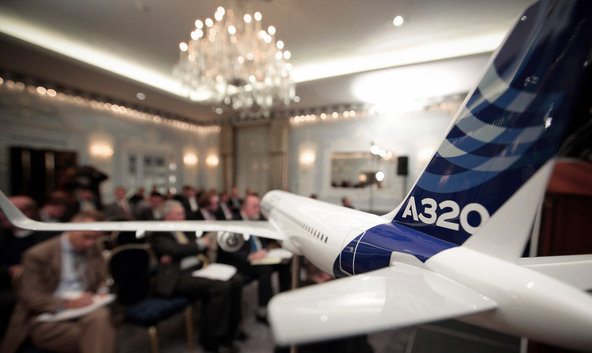 Jason Alden/Bloomberg NewsA model of an Airbus A320 aircraft was on display during a company news conference in London last year.
Jason Alden/Bloomberg NewsA model of an Airbus A320 aircraft was on display during a company news conference in London last year.
1:30 p.m. | Updated
PARIS – EADS and BAE Systems, Europe’s two largest aerospace and defense companies, said on Wednesday that they were in advanced discussion about a possible merger that would create one of the largest players in a fiercely competitive global industry.
Under the terms of the proposed deal, shareholders of European Aeronautic Defense and Space, as EADS is formally known, would own 60 percent of the combined company, while BAE would control the remaining 40 percent.
The combined company would surge ahead of Boeing in terms of revenue, said Guy Anderson, a senior defense industry analyst with IHS Jane’s in London. But he added, “there is no telling how much of the combined offering would have to be sold off to satisfy regulators.”
The combined market value of the two companies is roughly $49.8 billion, making the potential deal the largest aerospace merger since the acquisition of McDonnell Douglas by Boeing that was completed in 1997.
That older deal appears to be a model for the talks between BAE and EADS, which is the parent company of the commercial jet maker Airbus. In combining its huge commercial-airplane operations with McDonnell-Douglas’s military business, Boeing sought a more reliable revenue stream to offset the boom-and-bust cycles in passenger travel.
That worked out well after the terrorist attacks in 2001, when Boeing’s rapidly growing military business helped buffer it from a collapse in the demand for passenger jets. And over the last several years, Boeing’s commercial business has soared while its military operations have had to deal with budget cuts in many countries.
BAE, which is primarily a military company, is facing the same belt-tightening in its main markets, and it could benefit more in the short run from a combination than EADS, Boeing’s main competitor in building passenger jetliners.
EADS and BAE could also be seeking more lobbying muscle to compete with more vigorously with Boeing and other American military companies. BAE already has a strong presence in the United States, but EADS has had only limited success with American defense contracts. Last year, for example, the company lost a coveted $35 billion Air Force contract for aerial refueling tankers to Boeing. A merged EADS-BAE would likely derive about a -fifth of its sales from North America.
“On the face of it this will create one of the largest aerospace and defense organisations on the planet,” said Mr. Anderson, the IHS Jane’s analyst, who added that the combination would ”change the European defence market beyond recognition.”
In a statement made to the London Stock Exchange late Wednesday, BAE said the potential combination “would create a world class international aerospace, defence and security group with substantial centers of manufacturing and technology excellence in France, Germany, Spain, the U.K. and the U.S.A.”
EADS, which is incorporated in the Netherlands with headquarters in Toulouse, France, has sought for years to create a more equitable balance between its highly successful — but cyclically more volatile — commercial aircraft business and its much smaller defense and security activities, which include its Eurocopter helicopter unit, the Astrium space division, as well as Cassidian, which specializes in defense communications, security and surveillance systems.
Currently, Airbus currently represents about 65 percent of EADS revenue. But a combination with BAE, whose business is almost entirely focused on defense, would be expected to bring the split to roughly 53 percent commercial aerospace and 47 percent defense and security, said one person familiar with the details who spoke on condition of anonymity because the talks were ongoing.
According to the person with knowledge of the talks, EADS and BAE first began concrete discussions about a combination in June, about a month before Airbus announced plans for an assembly line in Mobile, Ala. — its first industrial foray in Boeing’s home market.
Both BAE and EADS have a long history of collaboration and are partners in a number of projects, including the Eurofighter jet. BAE also held a direct interest in the Airbus consortium for many years before selling it back to EADS in 2006.
Mergers of large companies that operate in more than one European country normally require the approval of the European Commission, which acts as the anti-trust regulator for the 27-nation European Union. The commission would not comment Wednesday on news of the talks.
Under British law, the two companies have until Oct. 10 to decide whether to pursue the merger.
Shares of BAE Systems rose 10.8 percent by the end of trading in London on Wednesday, while shares of EADS were down 5.6 percent. News of the merger talks was reported earlier on Wednesday by Bloomberg News.
Christopher Drew in New York and Mark Scott and Stephen Castle in London contributed reporting.
Article source: http://dealbook.nytimes.com/2012/09/12/bae-systems-and-eads-say-they-are-in-merger-talks/?partner=rss&emc=rss